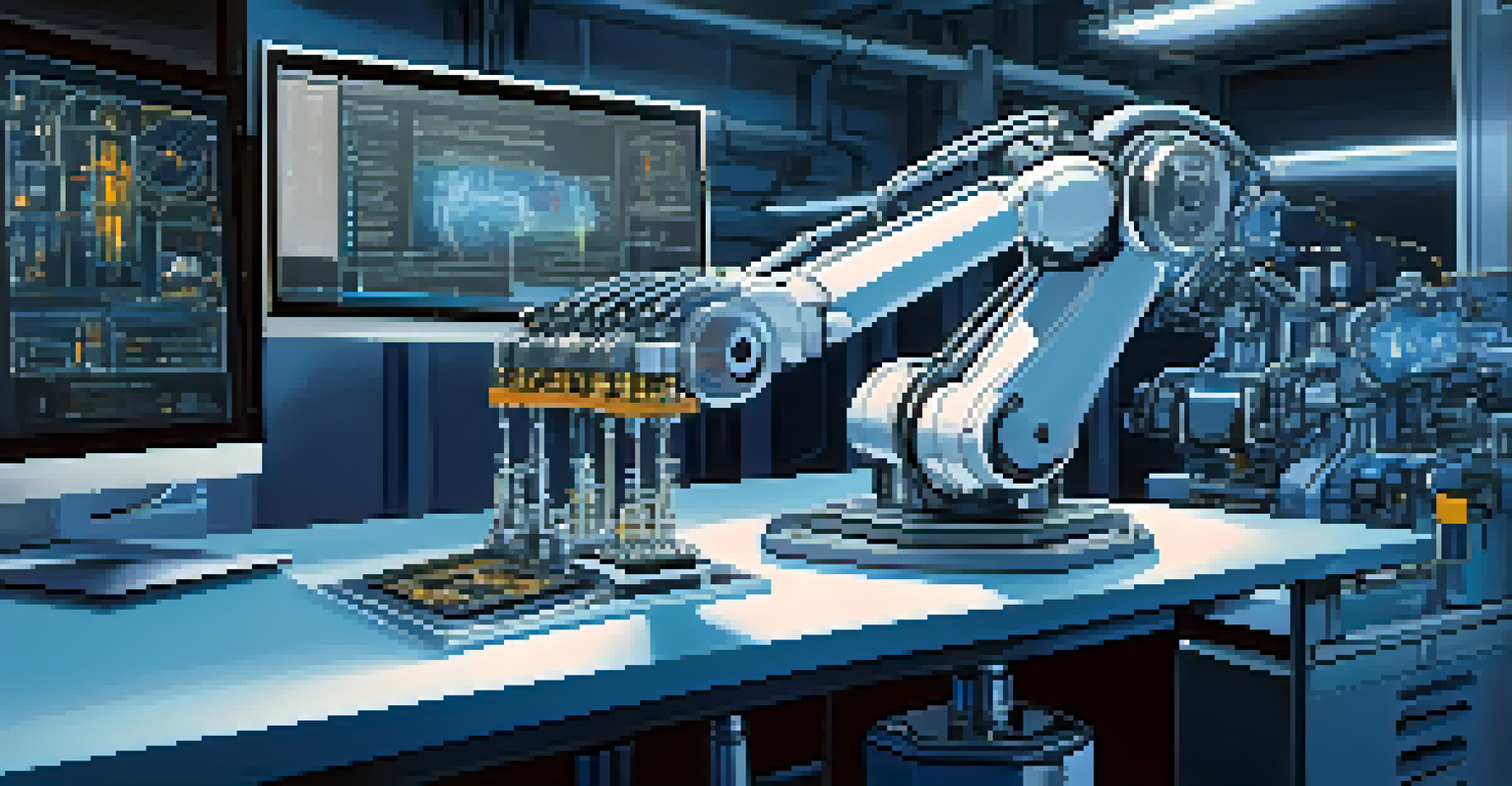Pittsburgh's Role in Advancing Artificial Intelligence Research

A Historical Overview of AI in Pittsburgh
Pittsburgh has long been a hub for technological innovation, with its roots tracing back to the rise of the steel industry. This city transitioned from manufacturing to a more knowledge-based economy, setting the stage for advancements in artificial intelligence (AI). Early AI work at institutions like Carnegie Mellon University (CMU) laid a solid foundation for what would become a flourishing research community.
The science of today is the technology of tomorrow.
In the 1970s, CMU created one of the first computer science departments, which became a breeding ground for AI research. The establishment of the Robotics Institute in 1979 marked a pivotal moment, pushing the boundaries of how machines interact with their environments. The collaboration between academia and industry in Pittsburgh has fueled a vibrant ecosystem that continues to thrive today.
The historical context of Pittsburgh's technological evolution highlights the city's adaptability and commitment to innovation. This legacy has not only shaped local research but has also influenced global advancements in AI, showcasing Pittsburgh as a significant player in this exciting field.
Carnegie Mellon University: A Leader in AI Research
Carnegie Mellon University is often regarded as the epicenter of AI research in Pittsburgh, attracting top talent from around the world. Home to the School of Computer Science, CMU has produced groundbreaking work in machine learning, natural language processing, and robotics. The university's collaborative environment encourages interdisciplinary research, making it a hotbed for innovative AI solutions.

The Robotics Institute at CMU is particularly renowned for its advancements in robotics and autonomous systems. Projects like the self-driving car initiative have garnered significant attention, proving that Pittsburgh is at the forefront of integrating AI into real-world applications. CMU's approach to education and research inspires students and researchers to push the envelope further.
Pittsburgh: AI Innovation Hub
Pittsburgh's historical evolution and strong research institutions have established it as a key player in the field of artificial intelligence.
CMU's influence extends beyond academia; it has partnered with various companies to drive technological advancements. This synergy between research and industry has led to the creation of startups and initiatives that continue to shape the AI landscape, further solidifying Pittsburgh's reputation as a leader in the field.
The Role of Local Startups in AI Innovation
Pittsburgh's startup scene has blossomed, with many new companies focusing on artificial intelligence and machine learning. These startups are leveraging the research from institutions like CMU to develop cutting-edge technologies. With access to a skilled workforce and a supportive ecosystem, entrepreneurs are thriving in this environment.
Innovation distinguishes between a leader and a follower.
Companies such as Argo AI, which focuses on autonomous vehicle technology, exemplify how local startups are making significant contributions to AI. Their work not only powers innovation but also creates jobs and boosts the local economy. The collaborative spirit within the city encourages sharing resources and knowledge, which is essential for startup success.
Moreover, Pittsburgh's vibrant tech community fosters networking and collaboration among startups, researchers, and established companies. This interconnectedness accelerates innovation, allowing new ideas to emerge and evolve rapidly, contributing to the city’s reputation as a hotbed for AI advancement.
Industry Partnerships Driving AI Research Forward
Pittsburgh has seen a surge in partnerships between academic institutions and industry leaders, significantly advancing AI research. These collaborations allow for the practical application of theoretical concepts, bridging the gap between research and implementation. Companies like Google, Uber, and Amazon have established research facilities in Pittsburgh, further entrenching the city in the AI landscape.
These partnerships often lead to joint research initiatives, where university researchers and industry experts work side by side. This collaborative approach not only enhances the quality of research but also ensures that the outcomes are relevant and applicable in real-world settings. Such synergy is crucial for the rapid evolution of technology in a competitive market.
CMU Drives AI Research Forward
Carnegie Mellon University is a central force in AI research, fostering collaboration between academia and industry to create innovative technologies.
Furthermore, these industry partnerships provide funding and resources, enabling researchers to pursue ambitious projects. As a result, Pittsburgh benefits from cutting-edge advancements that can impact various sectors, from healthcare to transportation, showcasing the city's pivotal role in shaping the future of AI.
Pittsburgh's AI Research in Healthcare Applications
One of the most promising areas of AI research in Pittsburgh is its application in healthcare. With institutions like UPMC, a leading healthcare provider, the city is at the forefront of using AI to improve patient outcomes and streamline operations. This collaboration has led to innovative solutions that harness data analytics, predictive modeling, and machine learning.
For instance, AI algorithms are being developed to assist in diagnosing diseases early, enhancing treatment plans, and even predicting patient deterioration. By analyzing vast amounts of patient data, these AI systems can provide actionable insights that healthcare professionals can use to make informed decisions. Such advancements not only improve individual patient care but also contribute to the overall efficiency of healthcare systems.
Pittsburgh's commitment to healthcare innovation through AI exemplifies the city's ability to leverage technology for societal benefit. As research continues to evolve, the potential for transformative changes in healthcare is immense, positioning Pittsburgh as a leader in this vital field.
Education and Workforce Development in AI
As AI continues to grow, so does the demand for a skilled workforce. Pittsburgh is addressing this need through educational programs that focus on AI and related technologies. Local universities, including CMU and the University of Pittsburgh, offer specialized degrees, workshops, and boot camps designed to equip students with the necessary skills.
These educational initiatives not only prepare students for careers in AI but also foster a culture of innovation and creativity. By encouraging hands-on projects and collaboration with local companies, students gain valuable experience that makes them highly competitive in the job market. This proactive approach to education ensures that Pittsburgh remains a hub for AI talent.
Healthcare AI Development
Pittsburgh's integration of AI in healthcare is transforming patient care and operational efficiency through advanced data analytics and machine learning.
Additionally, community organizations and tech meetups contribute to workforce development by providing networking opportunities and mentorship. These platforms allow aspiring professionals to connect with industry leaders and gain insights into the latest trends and advancements in AI, further enhancing the city’s reputation as a center for AI research and development.
Future Prospects for Pittsburgh's AI Landscape
Looking towards the future, Pittsburgh's AI landscape is poised for growth and development. With its rich history of innovation, strong academic institutions, and thriving startup ecosystem, the city is well-equipped to continue leading in AI research. The increasing integration of AI in various industries will further highlight Pittsburgh's significance in the global tech arena.
As more companies recognize the value of AI, we can expect to see even more investment in research and development. This influx of resources will likely lead to breakthroughs that could change the way we live and work. Pittsburgh's collaborative environment will be essential in nurturing these advancements and fostering a culture of continuous improvement.

Ultimately, the future of AI in Pittsburgh looks bright. As the city embraces new technologies and cultivates talent, we can anticipate exciting developments that will not only benefit the local community but also contribute to the global AI narrative, solidifying Pittsburgh’s legacy as a leader in this dynamic field.